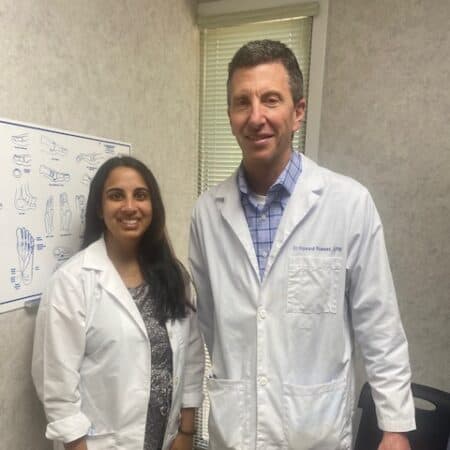

Podiatrists in
Newport News, VA
Newport News, VA 23601
Phone: 757-599-5710
Fax: 757-591-0552
Languages
- English
| Monday | 8:00 AM - 5:00 PM |
| Tuesday | 8:00 AM - 5:00 PM |
| Wednesday | 8:00 AM - 5:00 PM |
| Thursday | 8:00 AM - 5:00 PM |
| Friday | 8:30 AM - 12:00 PM |
Bunion Treatment in Newport News, Hampton & Carrollton, VA
Bunions are one of the most common foot disorders treated by Affiliated Podiatrists. In fact, bunions are one of the most common disorders treated by most podiatrists across the country. More than half the women in America have bunions, a common deformity often blamed on wearing tight, narrow shoes. Bunions cause the base of your big toe (Metatarsophalangeal Joint) to enlarge and protrude. The skin over it may be red and tender. This can be acquired through time or it can be congenital (you got it from your family)
Wearing any type of shoe may be painful when you have a bunion. The joint involved flexes with every step you take. The bigger your bunion gets, the more it hurts to walk. Bursitis (inflammation) may also set in. Your big toe may angle towards your second toe, or even move all the way under or over it. The skin on the bottom of your foot may also become thicker and painful.
Pressure from your big toe may force your second toe out of alignment, sometimes causing it to overlap your third toe. If your bunion gets too severe, it may cause difficulty in walking. Your pain may become chronic and you may develop arthritis. Most bunions can be treated conservatively with wider & softer shoes, pads to relieve the pressure and/or medications. If this does not help then surgical treatment is indicated.
Bunion Surgeons in Virginia
Bunion surgery, or bunionectomy, realigns the bone, ligaments, tendons and nerves so your big toe can be brought back to its correct position and the bump on the inside of the joint removed. Many bunion surgeries are performed on a same-day basis (no hospital stays) using a local anesthesia. During your recovery it is common to have pain and swelling. This swelling and stiffness may be persistent for several months.

